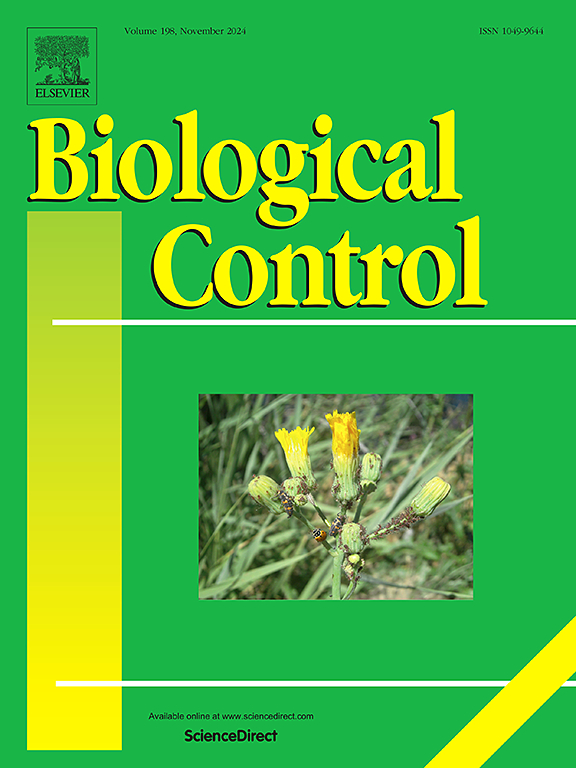优化 Velezensis TCS001 杆菌的发酵条件并评估其对草莓的生长促进和病害预防效果
IF 3.4
2区 农林科学
Q2 BIOTECHNOLOGY & APPLIED MICROBIOLOGY
引用次数: 0
摘要
枯草芽孢杆菌(Bacillus velezensis TCS001)是一种新型生物防治菌,具有广谱抗真菌活性和促进植物生长的作用,在农业生产中具有巨大的发展潜力。本研究通过单因素实验结合响应面方法优化了 B. velezensis TCS001 的发酵条件,并开发了 TCS001 悬浮浓缩液(TCS001-SC)的配方。评估了 TCS001-SC 促进草莓生长和防治草莓炭疽病的功效。确定 TCS001 的最佳液体发酵条件为:2.89 % 可溶性花生饼粉、3.0 % 葡萄糖、3.0 % 可溶性淀粉、0.002 % FePO4、0.006 % KCl、0.6 % NaCl、0.05 % MgCl2-6H2O、0.3 % K2HPO4、0.15 % KH2PO4、0.05 % CaCO3、0.005 % MnSO4、工作容积为 31 %(77.5 mL/250 mL)、转速为 173 r/min、培养温度为 28°C、接种量为 1.0 %、pH 值为 7.0。15 L 发酵罐升级培养的孢子数达到了 9.46 × 109 CFU/mL,是优化前孢子数 4.7 × 109 CFU/mL 的 2.01 倍,并以发酵液为主要成分初步开发出了 TCS001-SC。琼脂平板对抗试验表明,TCS001 对五种炭疽真菌具有抗真菌活性,抑制率在 70.3 % 至 87.2 % 之间。TCS001-SC 能促进草莓的生长,并诱导其叶片产生快速的防御酶反应,增强植物对病原体的抵抗力。处理后,草莓植株的叶片数、茎叶鲜重、根鲜重、叶面积、株高以及 POD、SOD、CAT 酶、GA、IAA 和 ABA 的含量与对照相比均有显著增加。在 2 × 107 CFU/mL 的浓度下,喷洒 5 次后的防治效果为 45%,与枯草芽孢杆菌可湿性粉剂等商业微生物制剂的药效无显著差异,后续将进行田间试验,以确定其作为微生物农药的潜力。这项研究为菌株 TCS001 未来的工业化生产和应用提供了重要支持。本文章由计算机程序翻译,如有差异,请以英文原文为准。
Optimization of fermentation conditions for Bacillus velezensis TCS001 and evaluation of its growth promotion and disease prevention effects on strawberries
Bacillus velezensis TCS001 is a novel biocontrol bacterium with broad-spectrum antifungal activity and plant growth-promoting effects, holding great potential for development in agricultural production. This study optimized the fermentation conditions for B. velezensis TCS001 through single-factor experiments combined with response surface methodology, and developed a formulation for TCS001 suspension concentrate (TCS001-SC). The efficacy of TCS001-SC to promote the growth of strawberries and to prevent and control strawberry anthracnose was evaluated. The optimal liquid fermentation condition for TCS001 was determined to be 2.89 % soluble peanut cake powder, 3.0 % glucose, 3.0 % soluble starch, 0.002 % FePO4, 0.006 % KCl, 0.6 % NaCl, 0.05 % MgCl2·6H2O, 0.3 % K2HPO4, 0.15 % KH2PO4, 0.05 % CaCO3, 0.005 % MnSO4, a working volume of 31 % (77.5 mL/250 mL), a rotation speed of 173 r/min, a cultivation temperature of 28°C, an inoculum volume of 1.0 %, and a pH of 7.0. The 15 L fermenter upscale culture achieved a spore count of 9.46 × 109 CFU/mL, which was 2.01 times the spore count of 4.7 × 109 CFU/mL before optimization, and a preliminary TCS001-SC was developed with the fermented broth as the main component. Agar plate confrontation tests showed that TCS001 had antifungal activity against five types of anthracnose fungi, with inhibition rates ranging from 70.3 % to 87.2 %. TCS001-SC could promote the growth of strawberries and induce a rapid defense enzyme response in their leaves, enhancing the plant's resistance to pathogens. After treatment, individual strawberry plants showed significant increases in the number of leaves, fresh weight of stems and leaves, root fresh weight, leaf area, plant height, and the content of POD, SOD, CAT enzymes, GA, IAA, and ABA compared to the control.Additionally, it shows good prevention and control effects against strawberry anthracnose, with a control efficacy of 60.45% after five spray treatments at a concentration of 2 × 107 CFU/mL, which is not significantly different from the efficacy of commercial microbial agents such as Bacillus subtilis wettable powder, subsequent field trials will be conducted to determine its potential as a microbial pesticide. This study provides important support for the future industrial production and application of the strain TCS001.
求助全文
通过发布文献求助,成功后即可免费获取论文全文。
去求助
来源期刊

Biological Control
生物-昆虫学
CiteScore
7.40
自引率
7.10%
发文量
220
审稿时长
63 days
期刊介绍:
Biological control is an environmentally sound and effective means of reducing or mitigating pests and pest effects through the use of natural enemies. The aim of Biological Control is to promote this science and technology through publication of original research articles and reviews of research and theory. The journal devotes a section to reports on biotechnologies dealing with the elucidation and use of genes or gene products for the enhancement of biological control agents.
The journal encompasses biological control of viral, microbial, nematode, insect, mite, weed, and vertebrate pests in agriculture, aquatic, forest, natural resource, stored product, and urban environments. Biological control of arthropod pests of human and domestic animals is also included. Ecological, molecular, and biotechnological approaches to the understanding of biological control are welcome.
 求助内容:
求助内容: 应助结果提醒方式:
应助结果提醒方式:


